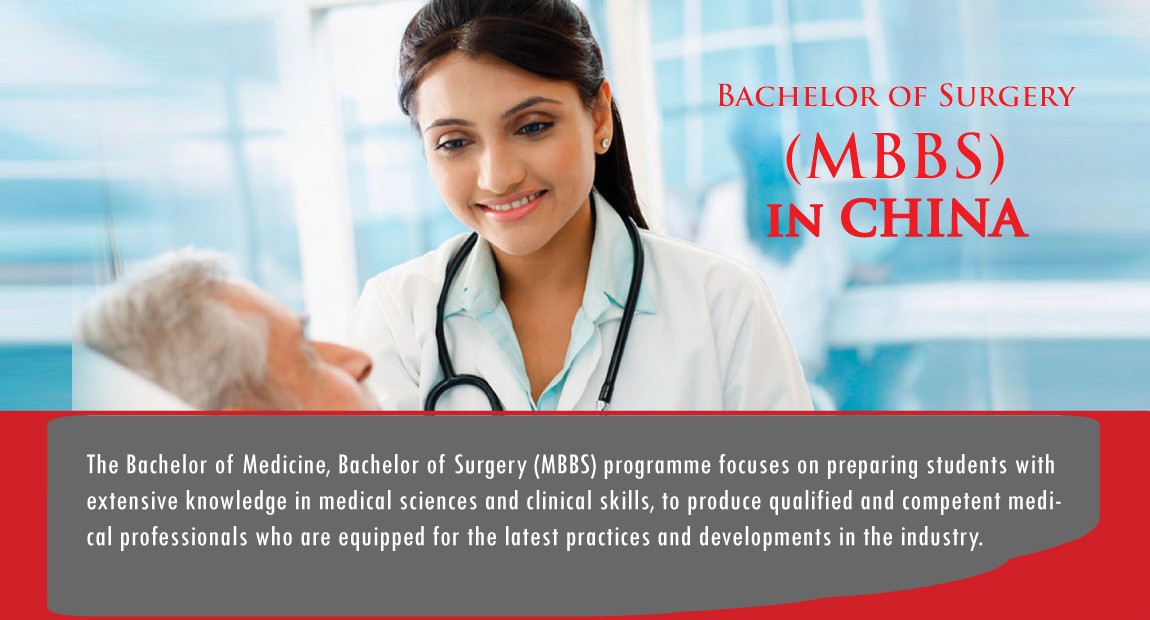As a token of Chinese medicine education flourishing, more and more of China’s universities have made MBBS one of their key courses for international students. In China’s University, students can not only acquire knowledge of basic theory but also practice internship in large hospitals as well as get deep insight and enhance clinical skills in a big way.
The majority of China MBBS Universities have been approved by the Ministry of China Education and enjoy a long history of offering courses in English medium with experienced, qualified and talented professors in this field.
Moreover, compared with other countries, studying in China is relatively cheap; you are able to experience various Chinese traditions, local customs, people and food with cheap daily living expenses while increasing your medical knowledge and skill.
China MBBS is a complete and mature knowledge system, a combination of theory and practice will be no doubt beneficial to all of you. After graduation, you can return to your country or go to another country and engage in the medical field as most of them are recognized and officially approved by the medical council.
| Tuition | Accommodation | Living Cost | Miscellaneous fees | In Total |
| 3,36,000 | 1,15,200 | 1,20,000 | 48,000 | 6,19,200 |
Only Current Year and Last year – HSC 12th (10+2) Pass-out Students can apply MBBS (Current Session)
![]() Must have passed qualifying examinations (‘A’ level) or equivalent examination.
Must have passed qualifying examinations (‘A’ level) or equivalent examination.
![]() Class 10 (X) or SSC/ ‘O’ or equivalent examination passed.
Class 10 (X) or SSC/ ‘O’ or equivalent examination passed.
![]() Class 12 (XII (10+2)] or ‘A’ or equivalent examination passed not before 2 Years
Class 12 (XII (10+2)] or ‘A’ or equivalent examination passed not before 2 Years
![]() Minimum aggregate GPA in SSC or equivalent and HSC or equivalent: 8.00 (eight)
Minimum aggregate GPA in SSC or equivalent and HSC or equivalent: 8.00 (eight)
![]() Minimum GPA either in SSC or equivalent or in HSC or equivalent: 3.5
Minimum GPA either in SSC or equivalent or in HSC or equivalent: 3.5
![]() Minimum GP in biology: 3.5
Minimum GP in biology: 3.5
![]() For Calculation of GPA against the marks obtained in ‘O’ level or equivalent exam, only the top 5 subjects are considered for calculation of GPA. Therefore GPA in ‘O’ level = (total marks obtained in the top five subjects} 5
For Calculation of GPA against the marks obtained in ‘O’ level or equivalent exam, only the top 5 subjects are considered for calculation of GPA. Therefore GPA in ‘O’ level = (total marks obtained in the top five subjects} 5
For calculation of GPA against the marks obtained in ‘A’ level or equivalent exam, only 3 subjects (Physics, Chemistry, and Biology) are considered for calculation of GPA. Qualifying Grade in each subject individually is “C”. Therefore GPA in ‘A’ level= (total marks obtained in three subjects) 3 Year of passing 12th Not More than One year gap. (That is if you apply for 2018 session, you must pass 2017 or after)
MBBS (Bachelor of Medicine and Bachelor of Surgery) has gained wide attention and popularity for students worldwide. Studying MBBS seems to have become a trend and goal for many international students to pursue with enthusiasm and endeavor. In Recent years, universities started setting up MBBS courses and enrolling international students on an exceptionally large scale. These schools are all recognized by the Medical Council of China and the World Health Organization. MBBS courses are taught in English Medium with accurate teaching skill and in accordance with international students’ requirements.
Generally speaking, MBBS duration is 6 years in China and comprises of theory researching and one year internship for practical experience. Since different universities have different criteria to evaluate students achievement, students in different universities should follow up the entire assessment index and tasks teachers assign them. Additionally, attention must be paid to laws and regulations of China’s University.
Why you should study medicine, how to get onto a medical degree, and the careers you can go into after graduation.
Most degrees in medicine are set up in a similar way, with a mix of theoretical and practical learning. Medical training starts out broad and becomes more specialized as the student moves through the course.
First, students undertake a foundation level programme. This gives them a broad underpinning in medical science and introduces them to the themes they will be encountering for the rest of their time studying medicine. Over one or two years, students will be introduced to science organized in it’s clinical, rather than its academic context – this means you’ll be studying circulation and breathing rather than biochemistry or physiology.
Medicine is a very practical area and students gain hands-on experience in teaching labs and the university hospital from early in their studies. Later stages of the course will focus on putting the learning from the first two or three years into practice, working in a hospital or community doctor’s practice.
Students can then progress to specialize in a field of their choice. This can take between three and seven years depending on which specialization they choose. Upon completion of their degree, medical practitioners will have to register with the health care authority of the country in which they intend to practice.
Put in simple terms, medicine is the science and practice of diagnosing, treating, and indeed preventing disease.
Medicine has always been a popular choice for university study. So much so that some of the world’s very first universities were medical schools – there has always been a need for highly-educated doctors.
Medicine is a very broad subject area and can lead to jobs in a range of areas. There are more options than ever for graduates wishing to specialize in a particular field.
The path into medicine is tough, and courses are generally at least five years long. Many universities have their own teaching hospitals, allowing students to gain practical experience early on in their studies, equipping them for the realities of working life in the medical profession.
If you want to study medicine you will need good grades in sciences and maths. Many universities require top grades in chemistry and prefer graduates to have good grades in subjects like biology, physics, and maths. Excellent communication skills and a good bedside manner are also extremely important in this career as well as an understanding of ethics, although this is also taught as part of the degree.
Other useful skills for studying medicine include time management, attention to detail, organization, problem-solving, discipline, teamwork, leadership, and patience. As well as the practical medical skills there is also a lot of administrative work that doctors have to do, keeping patient records up to date and making sure paperwork is filled out. Medicine is a demanding career that requires you to completely commit but the rewards are well worth the years of study and late nights on the wards.
There are a lot of options open to students studying medicine after they graduate. Few medical graduates find themselves looking for work for long since employment rates are higher than 90 per cent for medical graduates.
There are so many branches of medicine it can appear daunting, but students will receive guidance during the foundation stages of their course as to what specialisation is right for them. Options include: emergency medicine, practice medicine, nursing, paediatrics, radiology, obstetrics and gynaecology, anaesthetics and surgery.
Whatever specialisation you choose you can be sure of a rewarding career; doctors and medical professionals are well respected the world over and rates of pay for some jobs in medicine are very high.
Occasionally medical graduates choose not to practise medicine in which case there are other options open to them. Some become journalists, public health workers or medical researchers while others work for companies who provide medical expertise to public health services, helping to train local doctors in cutting-edge techniques and equipment.
A surprising number of celebrities studied medicine before they found the limelight.
Author and screenwriter Michael Chrischton, the creator of Jurassic Park and numerous other novels and screenplays attended Harvard medical school and graduated with an MD in 1969. He never went on to practice medicine but his experiences as a student doctor working at Boston City Hospital inspired him to create the hit American TV series ER.
The guerrilla fighter and left-wing revolutionary Ernesto ‘Che’ Guevara graduated from medical school in Argentina in 1953.

Axiom Education Group is the first and most influential institution in Bangladesh to recruit international students and being especially outstanding on its role and cooperation with Chinese universities with the long-standing history, guaranteed resource, and reliable information.
We began enrolling international students in the early part of 2003; hence, we have gained rich experience in this field. Our institution has throughout the years established relationships with more than 35 of China’s Universities all of which are approved by the China Ministry of Education. We cover a wide range of universities offering MBBS & Engineering courses in English medium.
List of Chinese Universities and Courses Available for Scholarship Download list and MBBS Guide Download




































